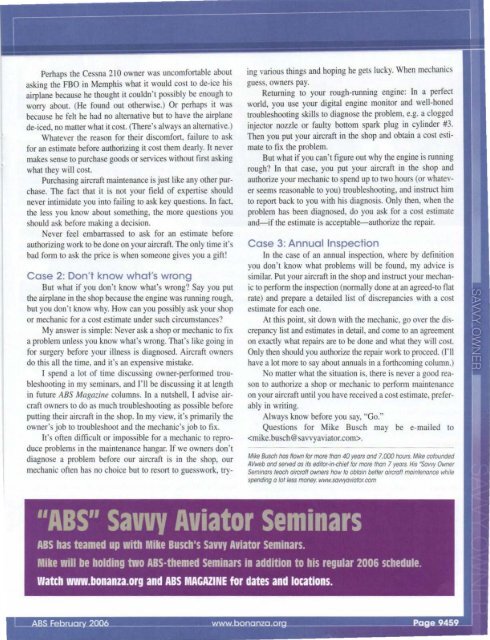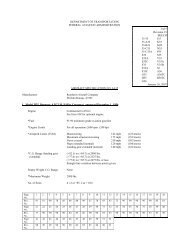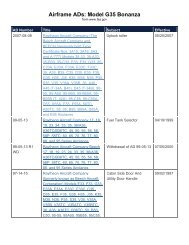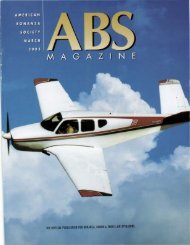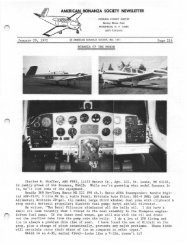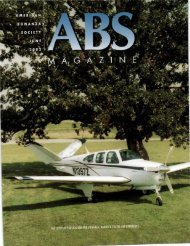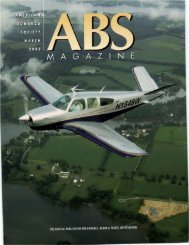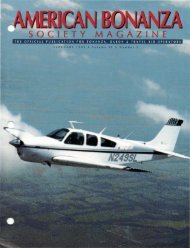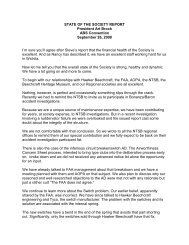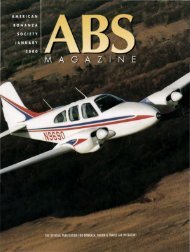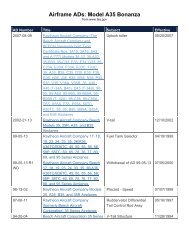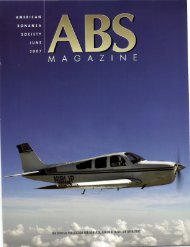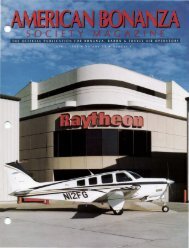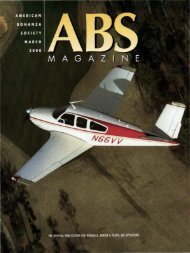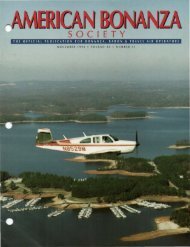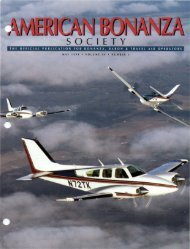KNOW BEFORE YOU SAY "GO"On a winter Friday evening about a year ago, a TexasbasedABS member loaded three fanuly members intohIs Baron and flew to Kansas City for the weekend.One of the aircraft's vacu um pumps failed over Oklahoma.Upon landingat MKC, the owner asked the FBO if they couldreplace the faIled pump in time for his planned departure lateSunday afternoon. They said yes, and the owner gave them ago-ahead.When the owner and his family returned to MKC onSunday afternoon, he was pleased that the pump had beenreplaced as advertised. But when he gave the FBO his creditcard to pay the bill, he was told that the invoice wouldn't beready until Monday when the bookkeeper returned to work.The FBO insisted that the owner sign a blank credit cardslip to cover the work. The owner was initially unwilling, butultimately capitulated when it became obvious that was theonly way to get the FBO to release his airplane.When the FBO's charge finally showed up on the owner'scredit card. it turned out to be over $1.900. The pump wasinvoiced at $1 ,400-well above the list price of $1,090 andalmost twice the usual "street price" of $800. The labor chargewas about $500 for a job that shouldn 't have taken more thanan hour.The owner was upset, of course. He fired off a nastygramto the owner of the FBO and vowed never to patronize themagain. But in the final analysis, the owner was stuck paying abill he appropriately considered outrageous.This sort of thing is hardly uncommon. [know one ownerwho was charged nearly $1,000 to have his Cessna 210 deicedin Memphis; another was charged $350 for one hour in aheated hangar to melt the snow off his light twin near Boston ;and yet another was charged $180 at Washington Dulles tohave two tires aired up on his Skylane.Most of these incidents occurred at large FBOs that catermostly to the bizjet se!. But such FBOs certainly aren't theonly offenders.Recently, a mechanic removed a leaking fuel selectorvalve from a <strong>Bonanza</strong> and sent it to a well-known FAAapprovedrepair station for overhaul. After inspecting thevalve, the repair station quoted $2,000 to overhaul i!.At this point, the aircraft owner wisely intervened, directedthe repair station to return the leaky valve, and sent it to aCalifornia repair station where it was overhauled for $375.While these may be extreme cases, I sincerely doubt thereare many aircraft owners who haven't fe lt blindsided by whatwe considered to be an unreasonable maintenance invoice.(Been there, done that, got the T-shirt to prove i!.)The First Commandment[n almost every such case, these unpleasant surprisesoccur because the aircraft owner authorized the work withoutfirst asking the cos!. In doing that, the owner broke the firstcommandment of aircraft maintenance:Never permit a shop or mechanic to perform maintenanceon your aircraft until you haye received and approl'ed a statementof work and cost estimate (preferably in writing). If andwhen you approve them. instruct the shop or mechanic not toexceed the cost estimate without fltSt obtaining your explicitapproval.I find it amazing how often this commonsense commandmentis broken. In almost every other sort of commerce, itwould be absolutely unthinkable for someone to purchasegoods or services without knowing what they will cos!. Mostof us would never buy a headset, a pair of sunglasses or agallon of IOOLL without checking the price. Nor would weconsider hiring a plumber to install a new water heater aroofer to fix a leak, or a garage to replace a muffler with~utfirst obtaining a quotation or estimate.Yet more often than not, aircraft owners put their plane ina shop and authorize work to be done without obtaining evena verbal estimate, much less a written quote. Frequently, thefirst time they learn whal the work will cost is when it isfinished and they are presented with the invoice. At that point,it is too late to influence the outcome; they can only complainand lick their wounds.Why do we do this? [ can think of three reasons:I. We're uncomfortable asking the shop or mechanic for acost estimate.2. The aircraft has a known problem, but we don 't yetunderstand what's wrong sufficiently for the shop or mechanicto estimate how much work needs to be done or what partsneed to be replaced.3. The aircraft is in the shop for an inspection, so we don'tyet know what problems are going to be found , much lesswhat parts and labor will be needed.Let's consider these three cases in turn.Case 1 : Uncomfortable askingI suspect the Baron owner was uncomfortable about askingthe Kansas City FBO for an estimate to replace his failedvacuum pump. Perhaps he felt the FBO was doing him a favorto do the work over the weekend. (They weren't-their laborrate was top dollar, and they charged time and a half for theweekend labor.) Or perhaps it was because this big-city FBOwas one that catered largely to the bizjet crowd-you know,the "if you have to ask, you can't afford it" guys.
Perhaps the Cessna 210 owner was uncomfortable aboutasking the FBO in Memphis what it wou ld cost to de-ice hisairplane because he thought it couldn't possibly be enough toworry about. (He found out otherwise.) Or perhaps it wasbecau e he felt he had no alternative but to have the airplanede-iced, no matter what it cost. (There's always an alternative.)Whatever the reason for their discomfort, failure to askfor an estimate before authorizi ng it cost them dearly. It nevermakes sense to purchase goods or services without first askingwhat they will cost.Purchasing aircraft maintenance is just like any other purchase.The fact that it is not your field of experti se shouldnever intimidate you into failing to ask key questions. In fact,the less you know about something, the more questions youshould ask before making a decision.Never feel embarrassed to ask for an estimate beforeauthorizing work to be done on your aircraft. The only time it'sbad form to ask the price is when someone gives you a gift!Case 2: Don't know what's wrongBut what if you don't know what's wrong? Say you putthe airplane in the shop because the engine was running rough,but you don 't know why. How can you possibly ask your shopor mechanic for a cost estimate under such circumstances?My answer is simple: ever ask a shop or mechanic to fixa problem unless you know what's wrong. That's like going infor surgery before your illness is diagnosed. Aircraft ownersdo this all the time, and it's an expensive mistake.I spend a lot of time discussing owner-performed troubleshootingin my seminars, and I'll be discussing it at lengthin future ABS Magazille columns. In a nutshell , I advise aircraftowners to do as much troubleshooting as possible beforeputting their aircraft in the shop. In my view, it's primarily theowner's job to troubleshoot and the mechanic 's job to fix.It's often difficult or impossible for a mechanic to reproduceproblems in the maintenance hangar. If we owners don'tdiagnose a problem before our aircraft is in the shop, ourmechanic often has no choice but to resort to guesswork, tryingvarious things and hoping he gets lucky. When mechanicsguess, owners pay.Returning to your rough-running engine: In a perfectworld, you use your digital engine monitor and well-honedtroubleshooting skills to diagnose the problem, e.g. a cloggedinjector nozzle or faulty bottom spark plug in cylinder #3.Then you put your aircraft in the shop and obtain a cost estimateto fix the problem.But what if you can't figure out why the engine is runningrough? In that case, you put your aircraft in the shop andauthorize your mechanic to spend up to two hours (or whateverseems reasonable to you) troubleshooting, and instruct himto report back to you with his diagnosi s. Only then. when theproblem has been diagnosed, do you ask for a cost estimateand-if the estimate is acceptable-authorize the repair.Case 3: Annual InspectionIn the case of an annual inspection, where by definitionyou don 't know what problems will be found, my advice issi milar. Put yo ur aircraft in the shop and instruct your mechanicto perform the inspection (normally done at an agreed-to flatrate) and prepare a detailed list of discrepancies with a costestimate for each one.At this point, sit down with the mechanic, go over the discrepancylist and estimates in detail, and come to an agreementon exactly what repairs are to be done and what they will cost.Only then should you authorize the repair work to proceed. (I'llhave a lot more to say about annuals in a forthcoming column.)No matter what the si tuation is, there is never a good reasonto authorize a shop or mechanic to perform maintenanceon your aircraft until you have received a cost estimate, preferablyin writing.Always know before you say. "Ga."Questions for Mike Busch may be e-mailed to.Mite Busch has flown for more than 40 years and 7.000 hours. Mike cofoundedAVweb and served as irs editor·in-chief for more than 7 yeors. His "Savvy OwnerSeminars teach aircraft owners how to obtain better aircraft maintenance whifespending a 101 less money. www.savvyoviator.com


